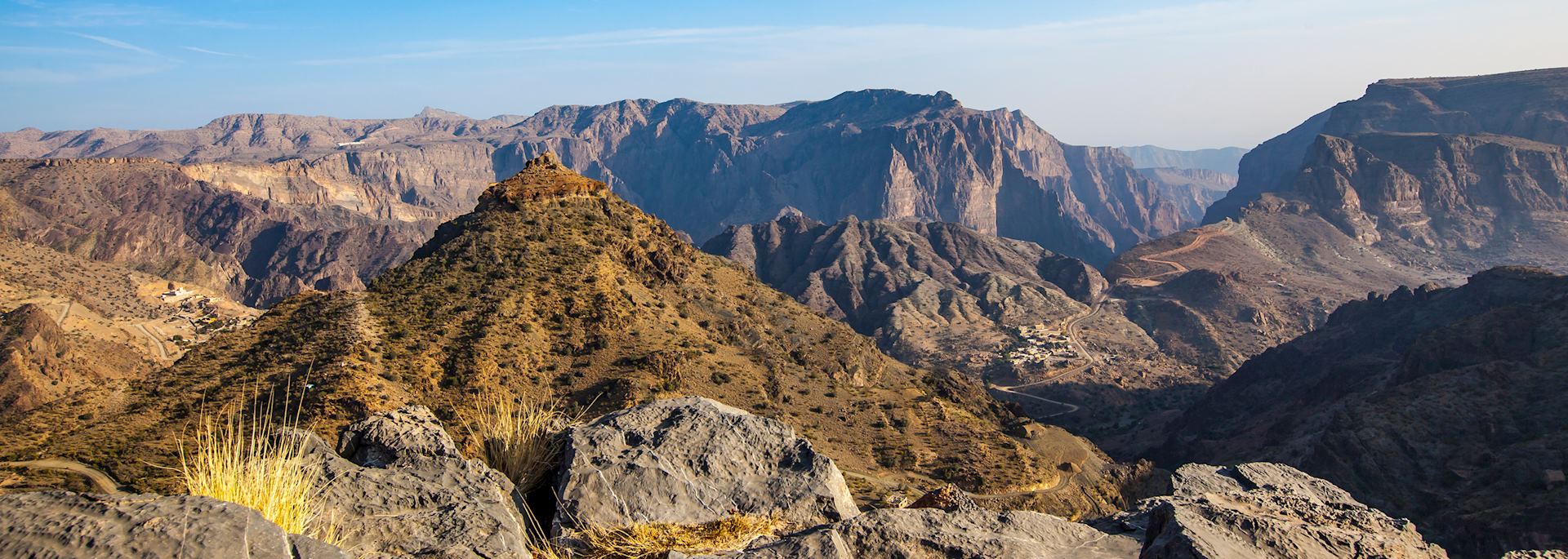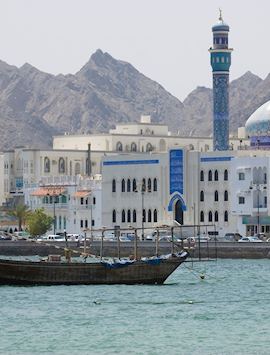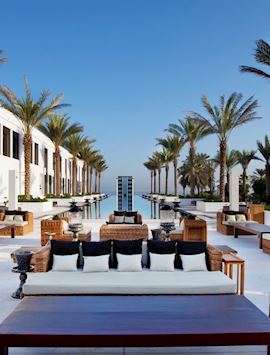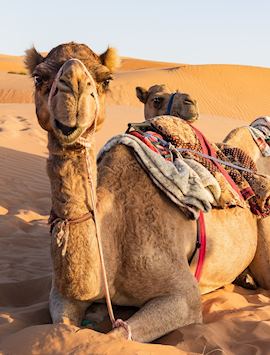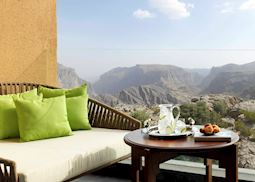Jump to:
At first glance Jebel Akhdar’s name, which translates to Green Mountain, seems misguided or even ironic. The designation encompasses the Saiq Plateau, a massive upland of mostly barren rock sporting just a few hearty bushes and trees, as well as the surrounding bare-sloped mountains.
However, we can help you discover hidden wadis and terraces where apricots, pomegranates, walnuts and roses all flourish in cooler, high-altitude temperatures. Additionally, you can experience the mountains’ panoramic views, small traditional villages and rose-water distilleries.
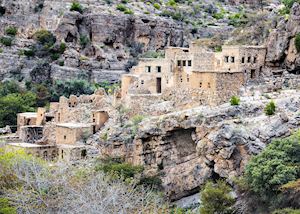 The region, a two-hour drive from Oman’s capital of Muscat, is often overlooked thanks to its remote location and rugged terrain. However, those who make the trek there can glimpse authentic Omani villages and take in sweeping mountain views.
The region, a two-hour drive from Oman’s capital of Muscat, is often overlooked thanks to its remote location and rugged terrain. However, those who make the trek there can glimpse authentic Omani villages and take in sweeping mountain views.
A guided walk is a good way to see both the villages and the hidden gardens and orchards that give the region its name. We can arrange a walk that begins at the village of Al Aqur and offers views of the Wadi Al Muaydin and nearby villages. The trail, known as W18b, winds past several small villages as well as terraces, orchards and gardens that still use falaj irrigation. This traditional form of irrigation includes low water channels that date back more than 1,500 years; the technique itself may be as old as 5,000 years, according to some scholars.
You can see more far-flung villages on a tour with a driver to navigate the mountain roads. The route lets you explore villages such as Wadi Bani Habib, an abandoned settlement of mud buildings that are slowly decaying back into the ground. There’s a footpath down to the bottom of the wadi where you’ll see walnuts and pomegranate trees.
The region’s best-known export is rosewater, used in desserts and as a scent across the region. You can buy some in the town of Saiq, but if you’d like to learn more, we can arrange for you to visit one of the traditional distilleries. In this simple building, with smoke-darkened walls, you’ll meet the master distiller and learn a little about the process and his tools — a mud-brick oven, woven baskets and silver dispensers.
Best time to visit Jebel Akhdar
The best time of year is March and April, when the damask roses are out. These fragrant heirloom blooms are known for their sweet perfume, which fills the air during early spring.
On a practical note: the mountains can get very cool and temperatures change rapidly as you move between sun and shadow, and up and down slopes. Dress in layers and be sure to bring warm clothes.
who's been there
Start planning your tailor-made trip to Jebel Akhdar by contacting one of our Oman specialists
- 617-223-4755
- Make an inquiry
Suggested itineraries featuring Jebel Akhdar
Our itineraries will give you suggestions for what is possible when you travel in Jebel Akhdar, and they showcase routes we know work particularly well. Treat them as inspiration, because your trip will be created uniquely by one of our specialists.
Places near Jebel Akhdar
- Nizwa 48 kilometers away
- The Batinah Plain 69 kilometers away
- Muscat 140 kilometers away
- The Wahiba Sands 207 kilometers away
- Sur 246 kilometers away
- Ras Al Jinz 283 kilometers away
- The Musandam Peninsula 323 kilometers away
Photos of Jebel Akhdar
Accommodation choices for Jebel Akhdar
We've selected a range of accommodation options for when you visit Jebel Akhdar. Our choices usually come recommended for their character, facilities and service or location. Our specialists always aim to suggest properties that match your preferences.
-
![Alila Jabal Akhdar, Jebel Akhdar]()
Alila Jabal Akhdar
Jebel Akhdar -
![Dusit D2 Naseem Resort]()
Dusit D2 Naseem Resort
Jebel Akhdar -
![Premier canyon view room balcony, Anantara Al Jabal Al Akhdar Resort, Jebel Akhdar]() Responsible ChoiceWe've hand-selected a range of tours and stays across the world that go above and beyond to be a force for good by supporting local businesses, educating staff, challenging local norms, or promoting conservation and biodiversity efforts. Your Responsible Choice helps increase the positive impact of your trip.
Responsible ChoiceWe've hand-selected a range of tours and stays across the world that go above and beyond to be a force for good by supporting local businesses, educating staff, challenging local norms, or promoting conservation and biodiversity efforts. Your Responsible Choice helps increase the positive impact of your trip.Anantara Al Jabal Al Akhdar Resort
Jebel Akhdar
